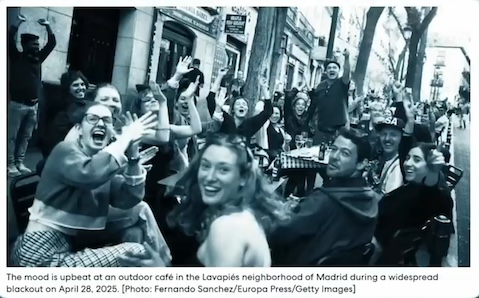
You may well be aware of the recent catastrophic power outages causing the Spain and Portugal blackout. It was said to be one of biggest blackouts in Europe’s history. Accident or not, there are a number of theories, technology-based explanations as to what happened. Was it a psyop? Will it happen again…?
However, this article is not about those accounts or explanations already put forward. Instead, it focuses on something different: Something very strange went on during the Spain and Portugal blackout with millions affected, but nobody’s talking about it.
Something shifted, and this may be more significant than realized.
During the Spain and Portugal blackout, while something happened, it was not seen on camera, nor was it documented in official accounts. What happened was internal. It was felt during the quietude.
Aware or not, this short-lived blackout-based internal experience caused mass behavioral changes.
Before explaining those behavioral changes and what caused them, and their significance consider this:
We live in world whereby we are constantly bombarded with high-sensory input. This perceptual high-sensory input, compressed into our 3-D, 5-sense experiences is shaped and molded through overstimulation, constant reaction and unrelenting distraction. Consider, for example, using gardening as a welcoming retreat.
“The American Psychological society tells us that “In terms of pure data consumption, it is thought that we’re now exposed to as much data in a single day than someone in the 15th century would be in their entire lifetime.”
-Let that sink in!
-This modern-day somewhat shallow existence doesn’t allow for depth. No time for introspection.
For instance, it’s not conducive for expressing one’s self as a coming from the heart.
Further, much of this high-sensory input is emotive, fast-paced and rooted in survival. Generally okay in small doses, as we’re able to adapt, but for many, when excessive, it leads to chronic stress.
This high-sensory input causes the “fight or flight” sympathetic nervous system to be constantly switched on which, in turn, hinders the “resting and digesting” parasympathetic nervous system’s ability to return the body back to baseline relaxation.
For example, consider the research done on Facebook. How social media leads to difficulties in stress recovery. Exposure to long-term frequent digital media sensory input, physical and cognitive fatigue may follow.
Living in the fast-lane modern-day world has made many people feel like something is not right.
Then, the lights went out…
Then, all of a sudden, not just literally, the metaphorical lights also went out during the Spain and Portugal blackout. I’ll explain.
No internet, no TV, no smartphone, no noises, no high-speed demands… i.e., no longer experiencing the constant bombardment of high-sensory overstimulation, reaction and unrelenting distraction, as there was there was a power outage, a radical behavioral shift happened. Those affected experienced a different frequency.
In the quietude, this frequency caused people to introspect, shift their focus of attention towards internal states. The resulting sense of presence and self-awareness is dubbed by neuroscience as interoception.
What’s even more interesting is that it goes further. More and more people at large are now becoming aware of the dissonance; breakdowns caused by high-sensory overstimulation and mental/physical burnout.
They’re realizing that that the solutions lie in reducing the stimulation, reaction and distraction by making shifts towards internal states, thus allowing the parasympathetic nervous system’s ability to return the body back to baseline relaxation without hinderance.
-More and more are choosing a lifestyle that allows mental and physical recalibration, achieving balance, coherence and clarity. A resulting shift in consciousness occurs.
This collective shift was unheard of 10 years ago. The upshot is that people and society are changing their behaviors with regard to how they see sensory input. Many are spending less time online. More people are appreciating the benefits of spending time on their own.
Then there’s an increased awareness or sensitivity to external stimuli. Noise, light and speed perceptions are elevated… Things get noticed that many had not been aware of before because the overstimulation, reaction and unrelenting distraction was no longer masking their perceptions of these things.
-The Spain and Portugal blackout with its quietude and stillness absent of the usual external rhythms may well have contributed to this.
Supporting research
The above solutions are supported by related research which is becoming increasingly valid.
For example, taking quietude, isolation and very low-sensory input to another level, more people report increased wellness through going to darkness retreats. Based on monastic disciplines, these darkness retreats have received much attention from neuroscience research, clinicians and high-performance studies.
It works like this: Typically, participants/clients may experience living in a totally dark environment for as long as several to ten-plus days. Their cooped up existence is distraction-free; no light signals, no input from outside.
There have been evaluations such as that from The International Conference of Mindfulness. Results of their studies on participants who had experienced and completed darkroom retreat programs showed positive results.
Having completed the darkroom retreat sensory-deprivation programs, participants showed substantial enhancements in mindfulness and self-awareness, both immediately after the experience and one month later. Also, there were reports of better sleep quality and lowered anxiety.
As with other studies on darkroom retreat sensory-deprivation programs, this study scientifically reaffirms therapeutic benefits.
On similar lines, there have been other studies on sensory-deprivation having different environmental set-ups to the above. Taking the case of monitored and controlled sensory-deprivation tanks, again, the results were positive.
After the sensory-deprivation tank experience, participants were found to have less stress, confirmed by lowered blood cortisol, better heart rate variability and enhanced attention.
These improvements through sensory-deprived experiences are not about technique, quite simply, it’s down to limiting input. The body’s responses are not extreme, but baseline recalibrations.
In conclusion
Did the Spain and Portugal blackout serve as a catalyst, acting as a wake up call?
During the blackout, as with other sensory limited situations, did its stark contrast existence compared to the hectic world we have come to know bring increasing realizations that maybe the new paradigm experience we’ve been waiting for is based on the frequency of living in an internal introspective world?
Something that has always been there for us to realize beneath the overlays. Something that begins not through ideology, but from direct experience. When experienced, when realized, there’s no going back. You cannot unsee it.
